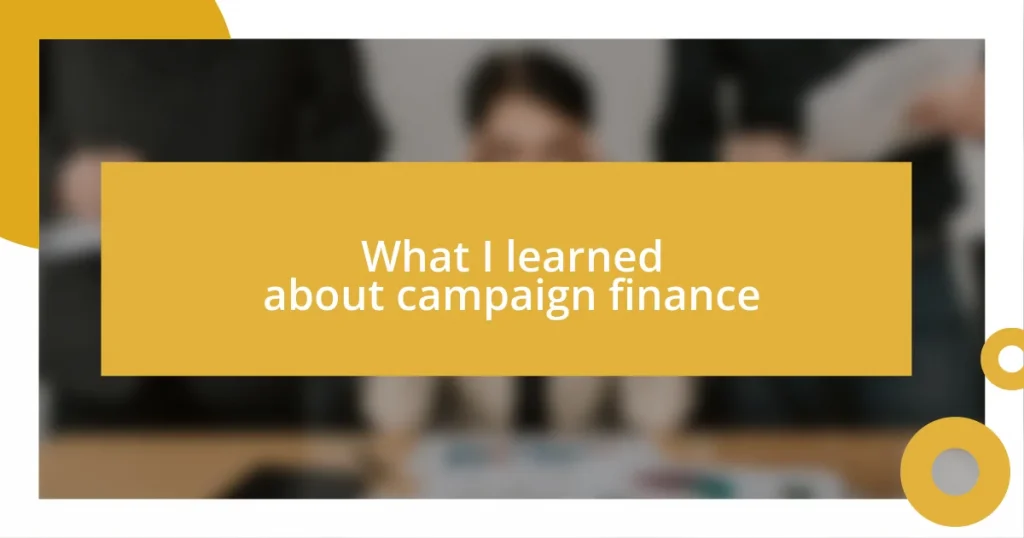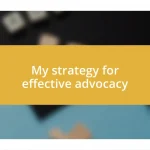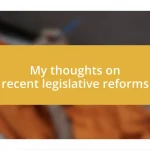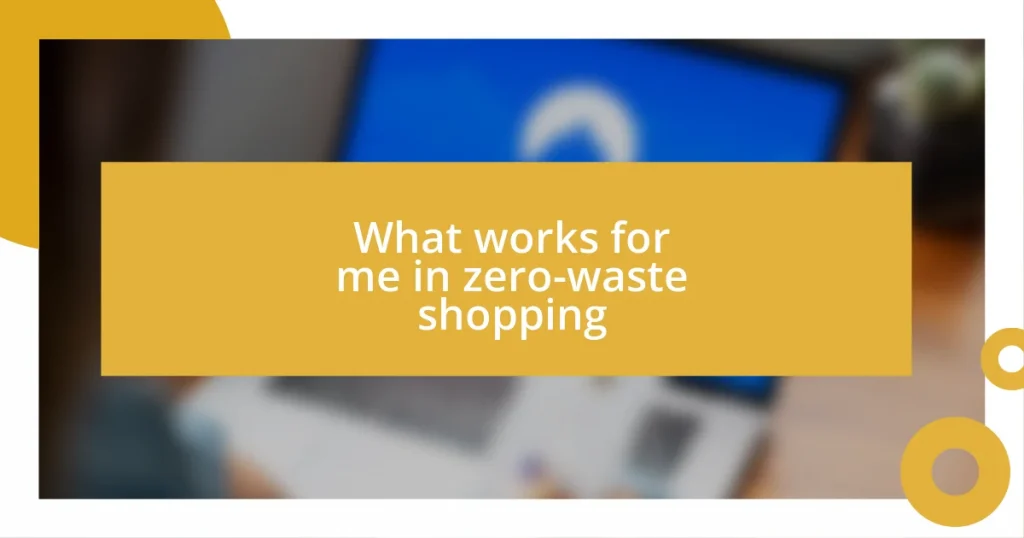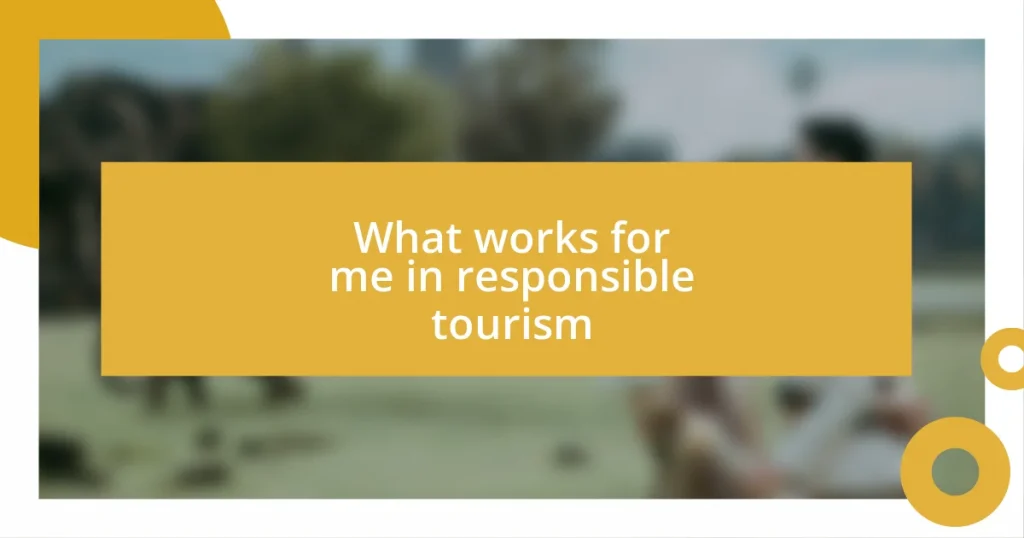Key takeaways:
- Campaign finance is crucial for political campaigns, influencing candidates’ visibility and outreach based on their fundraising strategies and financial backing.
- Campaign finance regulations are essential for ensuring fairness, promoting transparency, and preventing corruption in political funding.
- Effective fundraising strategies rely on personal connections, social media engagement, and targeted asks to foster community support and maximize contributions.
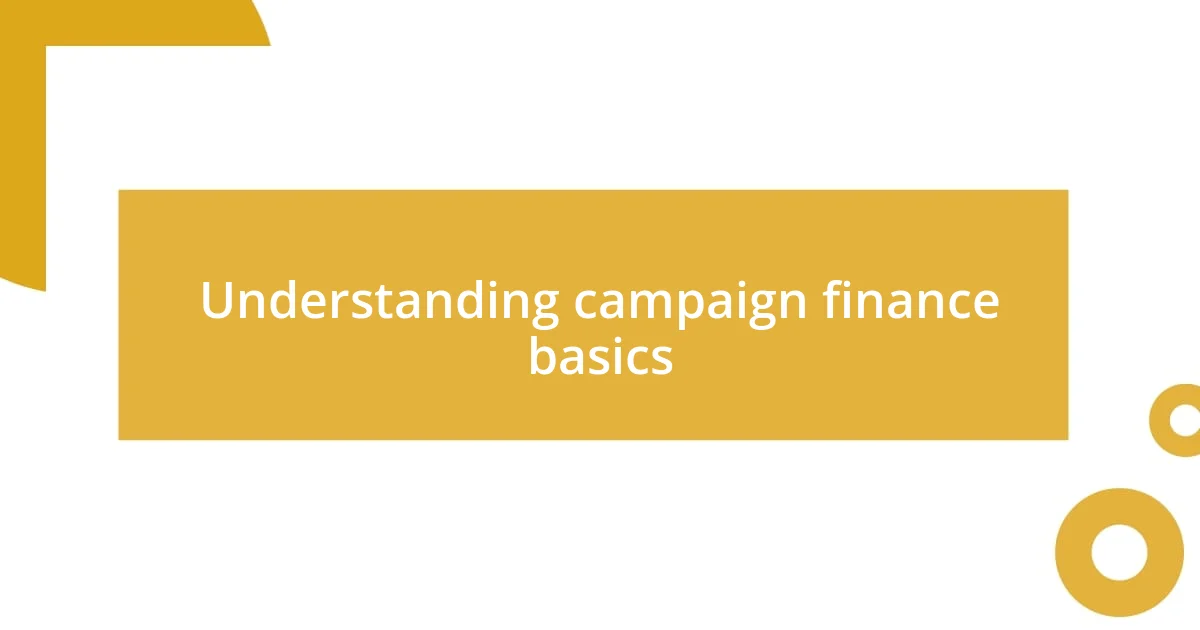
Understanding campaign finance basics
Campaign finance is essentially the lifeblood of political campaigns. I remember sitting in a local town hall meeting, and someone asked why their favorite candidate seemed to disappear after the primaries. The answer, of course, boiled down to money—the funds needed for advertising, staff, and outreach efforts. Have you ever wondered how some candidates seem to have endless resources while others struggle to be seen? It often comes down to fundraising strategies and who can tap into wealthy donors and Political Action Committees (PACs).
Understanding campaign finance means grasping the difference between ‘hard money’ and ‘soft money.’ Hard money refers to contributions that are directly regulated by law, while soft money can sometimes skirt these rules, allowing for greater sums to be raised but creating ethical dilemmas. I once spoke with a campaign manager who likened it to a chess game: the more pieces you have (read: funds), the more strategies you can implement. Just think about that next time you see a political ad; it’s fascinating to realize how much funding influences what we watch and hear.
Moreover, the landscape of campaign finance is continually shifting. I recall a few years back when a Supreme Court ruling opened the floodgates for corporate spending in elections. This decision left many feeling uneasy, as it seemingly empowered big businesses over the average voter. How do you feel about that? It’s a critical conversation about influence and representation that many of us don’t engage with deeply enough. Understanding these dynamics can really change how we view political participation in our communities.
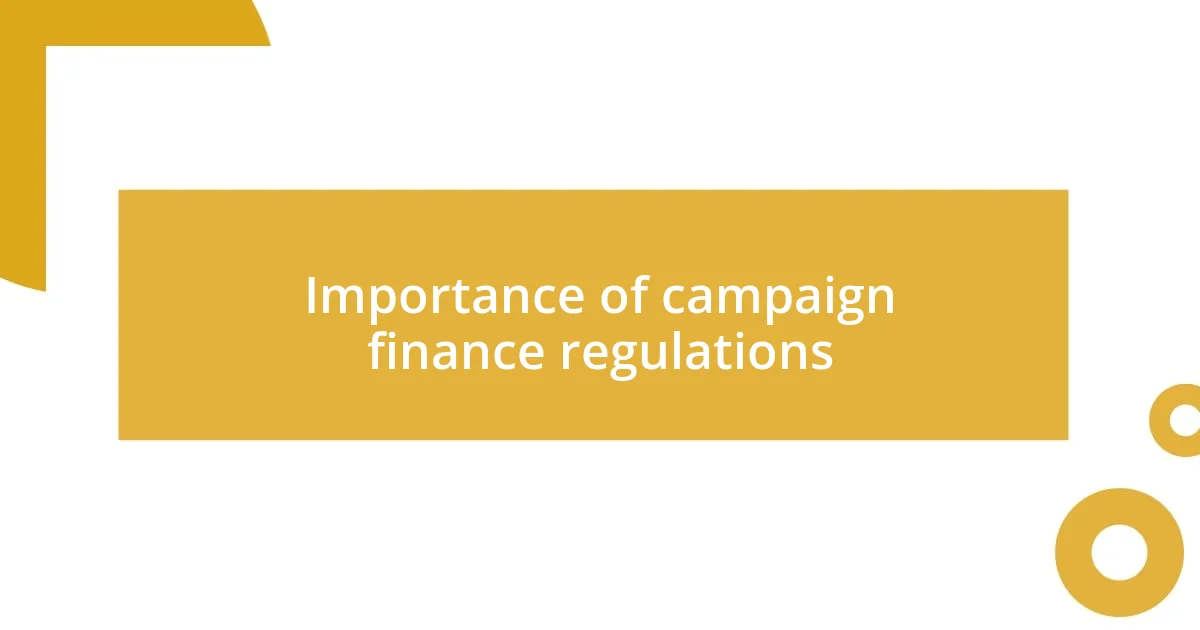
Importance of campaign finance regulations
The importance of campaign finance regulations cannot be overstated. In my experience, these regulations exist to level the playing field, ensuring that all candidates, regardless of their financial backing, have a fair chance to compete. I once spoke to a small-town candidate who shared how daunting it was to face off against someone with deep-pocketed donors. Without regulations, the disparities could grow even wider, making it difficult for grassroots movements to gain traction.
Another aspect I’ve noticed is that regulations promote transparency within political funding. I remember attending a community forum where a local activist passionately discussed the impact of undisclosed donations on voter trust. It hit me then; when voters are aware of who is supporting a campaign, they can make informed choices. That transparency fosters a more engaged electorate. Have you ever thought about how much you trust a candidate whose funding sources are murky? Transparency can build that trust.
Lastly, robust regulations can deter corruption and the inappropriate influence of money in politics. I recall a conversation with a veteran politician who lamented the pressure he felt when special interest groups came knocking. He feared that their financial support could require him to compromise his values. Imagine if those pressures were reduced! By establishing clear boundaries, regulations help candidates focus on serving their constituents rather than appeasing wealthy benefactors.
| Aspect | Importance |
|---|---|
| Leveling the Playing Field | Ensures fairness for all candidates |
| Transparency | Builds voter trust through openness |
| Corruption Deterrence | Protects against undue influence on politicians |
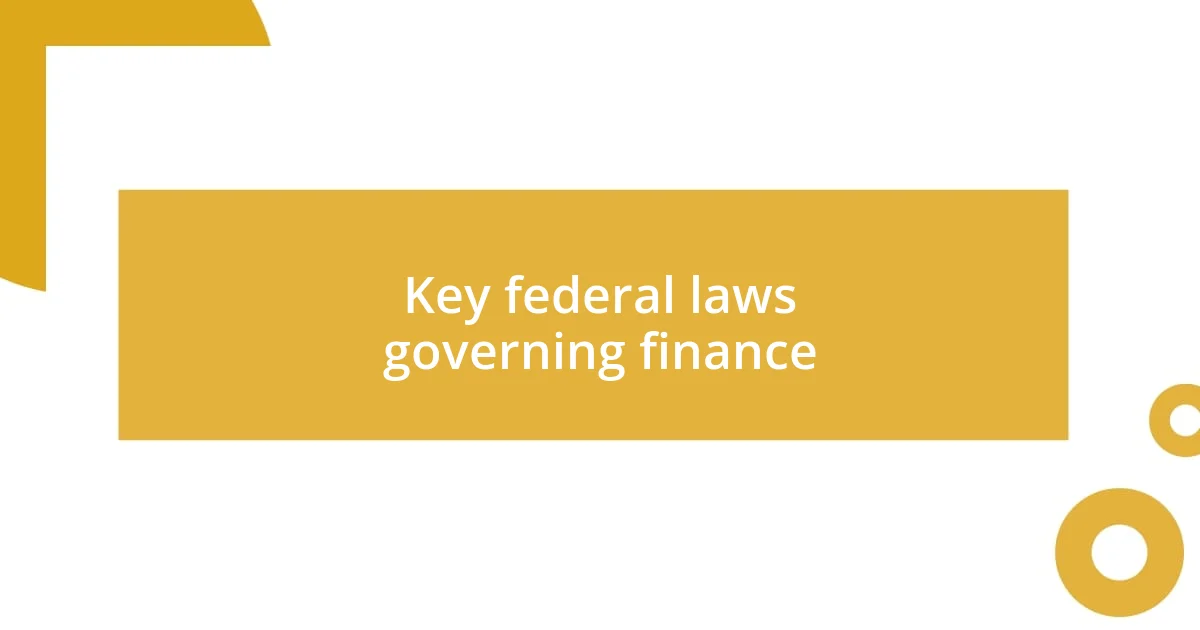
Key federal laws governing finance
Key federal laws govern campaign finance, shaping how money influences politics in the United States. From my perspective, the Federal Election Commission (FEC) plays a crucial role in this landscape. It oversees the administration of campaign finance laws, ensuring that candidates and political groups adhere to regulations. I once attended a workshop where an FEC staffer explained how complex these rules can get; it made me appreciate the challenges candidates face in navigating them. It’s almost like trying to follow an intricate recipe while ensuring you don’t leave out key ingredients to avoid a disaster later.
Here are some key federal laws that significantly impact campaign finance:
- Federal Election Campaign Act (FECA): Initially passed in 1971, this act limits contributions to candidates and requires disclosure of campaign financing.
- Bipartisan Campaign Reform Act (BCRA): Also known as McCain-Feingold, enacted in 2002, it aimed to regulate the flow of ‘soft money’ to prevent loopholes that could undermine campaign finance integrity.
- Citizens United v. FEC (2010): A landmark Supreme Court case that ruled corporate funding of independent political broadcasts cannot be limited, leading to a surge in Super PACs and outside spending.
These laws aren’t just dry numbers or legal jargon; they have real-world implications. I remember discussing these issues with my neighbors during election season. It was eye-opening to realize how much these regulations—or lack thereof—shaped their perceptions of candidates and the election process. How do we ensure our voices are heard, especially when financial forces can drown them out? It’s a question we all should be asking ourselves as elections approach.
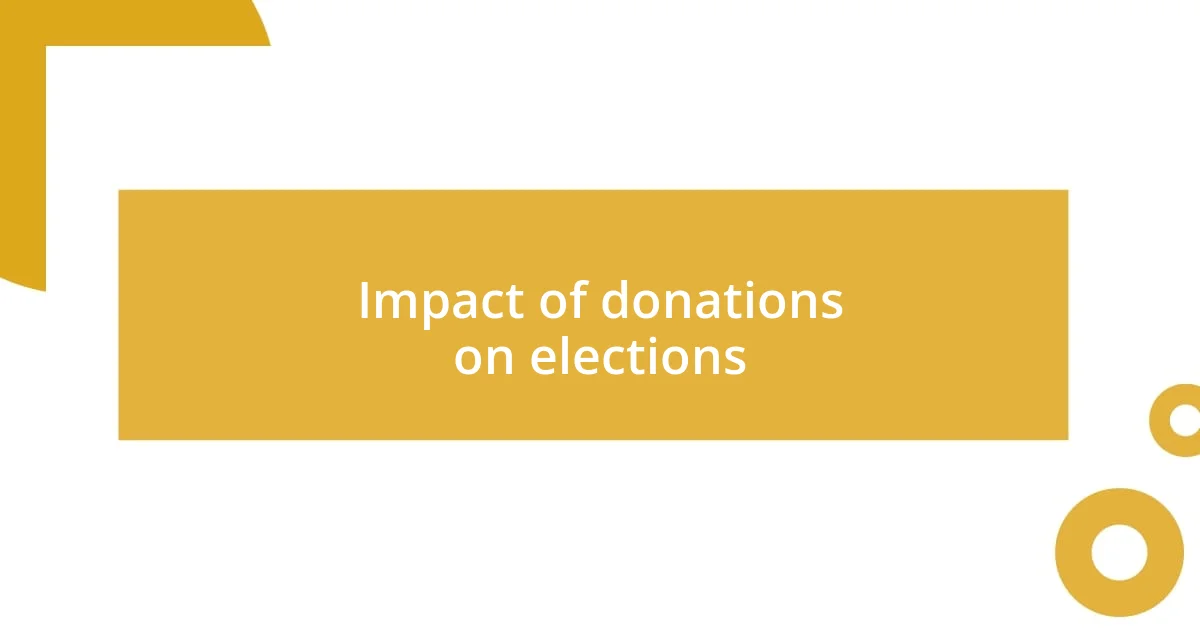
Impact of donations on elections
The influence of donations on elections is profound and often unsettling. I vividly recall watching a local election unfold where one candidate’s ad campaign seemed to dominate every platform. It hit me then; the sheer volume of funding gave them an overwhelming advantage over others who simply couldn’t afford such extensive outreach. This made me wonder, how many deserving voices are drowned out by those with wealth? It’s a reality that weighs heavily on the democratic process.
In my experience, large donations often dictate the narrative of an election, steering it toward the interests of a few rather than the collective needs of the community. There was a time I volunteered for a small campaign and witnessed firsthand how even a modest sum could carry immense weight. Each small donation felt like a community rallying behind a shared vision, but it also highlighted the stark contrast with candidates flush with cash from corporate backers. How can we bridge that gap? It’s essential to recognize that money doesn’t just influence campaigns; it shapes the very issues that are brought to the forefront.
I’ve pondered the psychological impact of this dynamic on voters. When faced with candidates who can seemingly buy their way into office, it’s not uncommon for people to feel disenfranchised. I remember chatting with a friend who expressed frustration at feeling like her vote didn’t matter in the face of big money. Isn’t it disheartening? Knowing that there are voices and initiatives that could genuinely address public concerns but are silenced by financial overpowering. Our elections should echo the will of the people, not the depth of someone’s wallet.
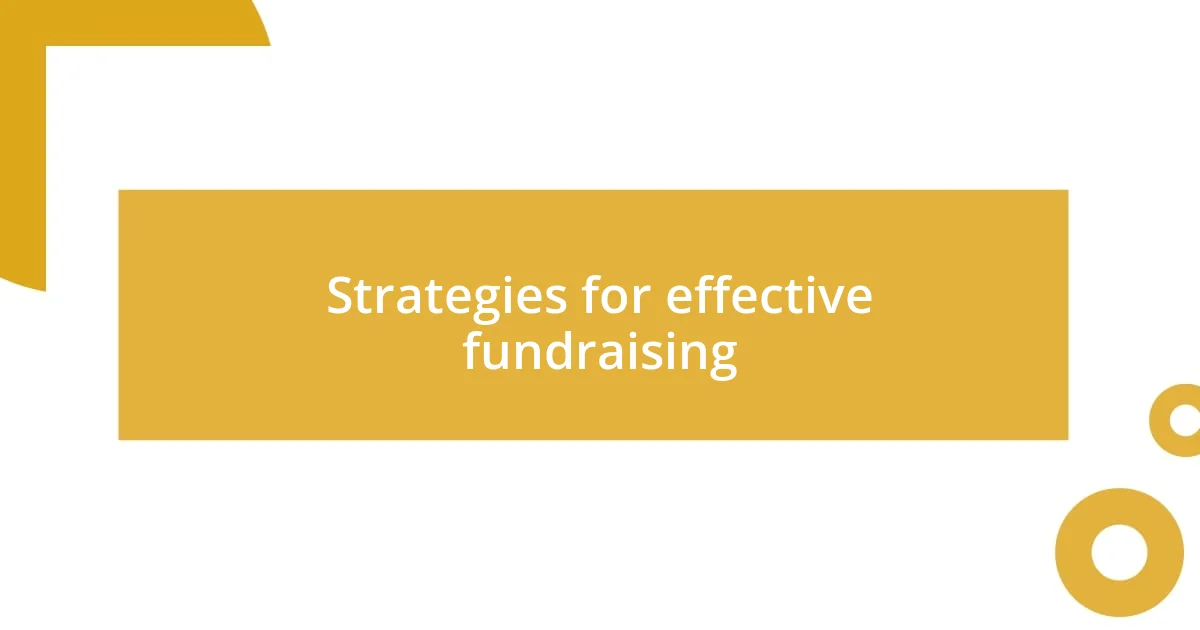
Strategies for effective fundraising
Effective fundraising is crucial for any campaign looking to make a lasting impact, and I’ve learned that personal connections often yield the best results. Last year, I participated in a local fundraising event where the candidate shared their story and vision with attendees. This intimate setting allowed contributors to feel a genuine connection, making them more inclined to donate. Isn’t it incredible how people are more willing to support a cause when they can see the heart behind it?
Another tactic that really resonates is leveraging social media to reach a wider audience. I remember when a friend’s campaign went viral after they posted a heartfelt video detailing why they were running. The response was overwhelming, and it turned into not just funds, but a community of supporters rallying around a common goal. It made me realize that authenticity can be more powerful than any polished advertisement—how often do we catch ourselves scrolling through our feeds, moved by a story that resonates with us?
Additionally, crafting targeted asks based on donor interests has proven effective in my experience. When I volunteered for a campaign, we often tailored our communications to reflect how each potential donor’s passions aligned with the candidate’s platform. For example, a local business owner was more likely to support environmental initiatives due to their values. Isn’t it fascinating how personalizing appeals can transform a simple request into a meaningful dialogue? In fundraising, making each donor feel valued can transform the landscape of support and significantly impact election outcomes.
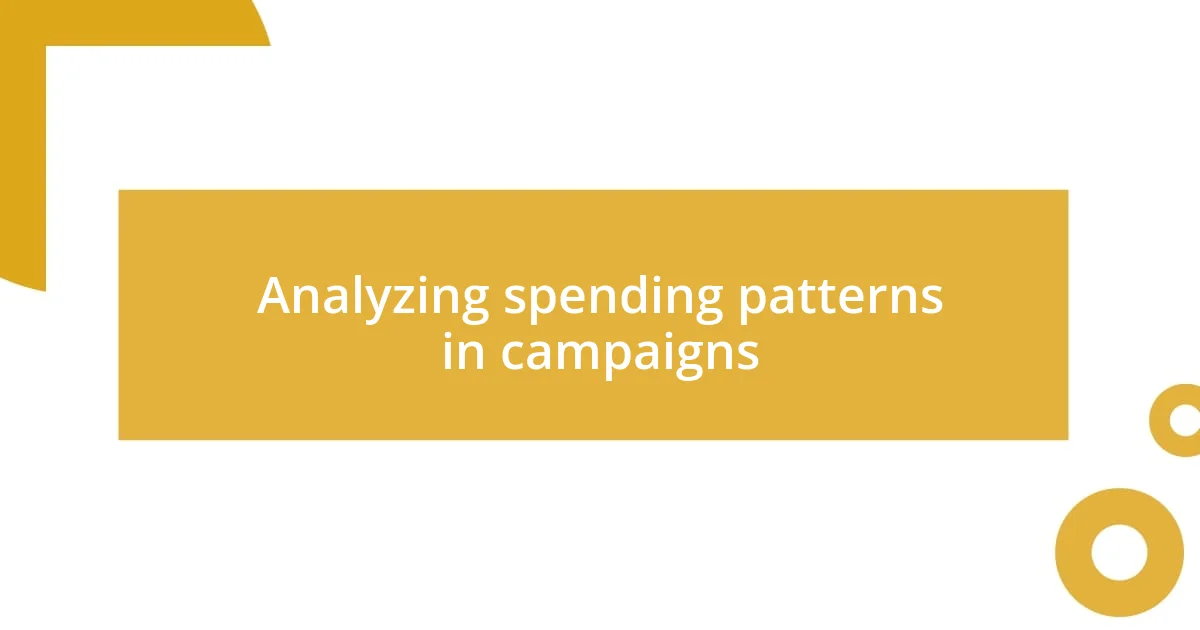
Analyzing spending patterns in campaigns
Spending patterns in campaigns reveal more than just numbers; they often tell a story about priorities and strategies. I remember examining a candidate’s budget breakdown during a heated election cycle. It struck me how a significant chunk was funneled into flashy advertising, while grassroots outreach seemed to take a backseat. How often do we consider what these spending choices say about a candidate’s connection to their community?
Analyzing these patterns can unveil intriguing insights. For instance, during my research, I noticed candidates who invested heavily in local events often fostered deeper community relations compared to those who targeted only state-wide media buys. I recall a campaign that thrived on personal interaction—candidates did town hall meetings and door-to-door canvassing. This made me wonder, could the predominantly digital spending overshadow the invaluable face-to-face connection that truly embodies democratic engagement?
Moreover, the timing of expenditures plays a crucial role in shaping outcomes. Early spending can establish name recognition, but I saw candidates who waited too long to ramp up their advertising efforts fall behind. One campaign I volunteered for haphazardly allocated funds and pushed ads last minute, which felt like a desperate attempt to catch up. It made me think: is it about the total amount spent, or how and when that money is deployed that truly matters? Understanding these nuances can lead to more informed decisions about campaign strategies and ultimately, a more engaged electorate.
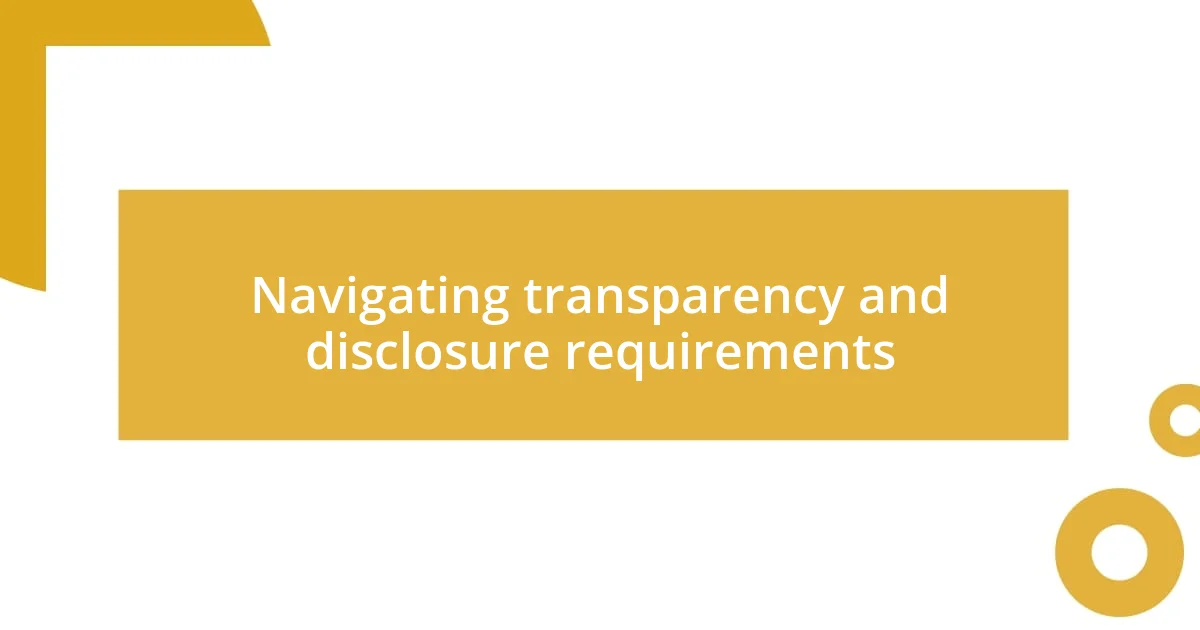
Navigating transparency and disclosure requirements
Navigating the intricacies of transparency and disclosure requirements can often feel like wandering through a maze. I remember a campaign I worked with that strived to maintain the highest level of transparency with our donors. We regularly published updates on fundraising sources and expenditures, making it clear not just to regulators, but to potential supporters, where their contributions were directed. How often do candidates evaluate the long-term benefits of such openness versus the fear of scrutiny?
One key aspect I learned is that clear and accessible reporting isn’t just about compliance; it builds trust. During one campaign season, we introduced an online portal where donors could track how their funds were spent in real-time. The positive feedback we received was overwhelming, and I realized that transparency wasn’t just a regulatory obligation but a genuine bond-building tool. Isn’t it heartening to see that the more information we share, the more engaged our supporters become?
In my experience, keeping ahead of disclosure requirements also requires continual education. I recall attending a workshop about the evolving regulations around campaign finance that truly opened my eyes. The rules can shift with little warning, influencing how campaigns structure their fundraising efforts. Staying informed not only helps avoid potential legal pitfalls but also empowers candidates to present themselves authentically in their communities. Isn’t it worth the effort to turn compliance into a strategic advantage?










